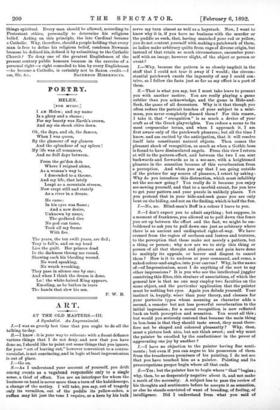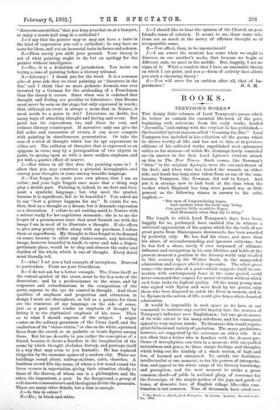ART.
AT ills, OLD MASTERS.—III.
A Symbolist. An Impressionist.
.T.—I was so greedy last time that you ought to do all the talking to-day.
S.—I know : it is your way to reiterate with a fluent defiance various things that I do not deny, and now that you have done so, I should like to point out some things that you ignore, for your " art of leaving out," however convenient to a. contro- versialist, is not convincing, and in logic at least impressionism is out of place.
1.—Go on.
5.—As I understand your account of yourself, you drift
among events as a vagabond responsible only to a single
sense, a thief of effect. You are an interloper for whom the business on hand is never more than a turn of the kaleidoscope, a change of the motley. I will take, you say, out of tragedy only its vermilion, out of the puddle its yellow-ochre, a ruffian may hit just the tone I require, or a. hero by his bulk serve my turn almost as well as a haystack. Now, I want to know why it is, if you have no business with the murder or the puddle as such, that, having snatched your red or yellow, you do not content yourself with making a patchwork of them, as ladies make arbitrary quilts from rags of diverse origin, but instead of that retain so much circumstance, encumber your- self with an image, however slight, of the object or person or event ?
I.--Why, because the pattern is so closely implicit in the stuff that I could not tear it away if I would ; the circum- stantial patchwork excels the ingenuity of any I could con- trive, so I follow the facts just so far as my effect is a part of them.
S.—That is what you say, but I must take leave to present you with another motive. You are really playing a game subtler than you acknowledge, and the game is Hide-and- Seek, the game of all decorators. Why is it that though you often reduce the portrait touches of your subject to a mini- mum, you never completely discard them ? For this reason,. I take it, that " recognition" is as much a device of your craft as of the Greek playwrights. You reduce a scene to its most crepuscular terms, and when I approach it, I am first aware only of the patchwork pleasure ; but all the time I know, and am excited by the anticipation, that it will resolve itself into constituent natural objects. Then comes the pleasant shock of recognition, as much as when a Gothic boss is found to have dissimulated angels. From this view I return at will to the pattern-effect, and between the two I am sent backwards and forwards as in a see-saw, with a heightened pleasure in the sensation because of this reverberation from a perception. And when you say that I am going outside of the picture for my source of pleasure, I retort by asking : Why do you introduce this distraction, which must infallibly set the see-saw going ? You really do it because you enjoy see-sawing yourself, and that to a morbid extent, for you love to get your pattern and your puzzle in unlikely places. Yet you pretend that in your hide-and-seek game you are only bent on the hiding, and not on the finding, which is half the fun.
1.—No, no. Blind-man's Buff is a colour I leave to you.
S.—I don't expect you to admit anything ; but suppose, in a moment of frankness, you allowed us to pull down this fence you set up between the effect and the fact, we might be em- boldened to ask you to pull down one just as arbitrary where there is an ancient and undisputed right-of-way. We have crossed from the region of surfaces and lustres and textures, to the perception that these make not merely a pattern, but a thing or person ; why now are we to strip this thing or person of all that thought and pleasure and pain have done to multiply its appeals, or horror and disgust to cancel them ? How is it to undress at your command, and come, a naked colon•-and-angles, into your canvas ? Why, in the name: of—of Impressionism, must I do anything of the sort to my other impressions ? It is you who are the intellectual juggler contriving this filter, this strainer of associations, of which the general law is that no one may employ two faculties on the same object, and the particular application that the painter must be nothing but eyes. Again you delude yourself. Your instinct is, happily, wiser than your theory, and chooses for your portraits types whose meaning as character adds a second, a remoter but not less powerful reverberation to the initial impression; for a moral recognition is now reflected back on both perception and sensation. You scout all this ; but would you seriously contend that because the main thing in bon-bons is that they should taste sweet, they must there- fore not be shaped and coloured pleasantly P Why, then, must a picture look nice, but not think sweet ; and why must the painter be excelled by the confectioner in the power of aggravating one joy by another ?
/".—I have no objection to the painter having fine senti- ments ; but even if you can argue to his possession of them. from the treacherous premisses of his painting, I da not see that you have touched him as a painter. Painting and its preoccupations proper begin where all that ends.
S.—Yes ; but the painter has to begin where " that "begins; why, then, be so desperately negative about it, and not make a merit of the necessity. A subject has to pass the review of his thoughts and sentiments before he accepts it as sensation, or else he stands convicted of want of breeding, of feeling, of intelligence. Did I understand from what you said of " decorous assemblies," that you keep your hat on at a banquet, or enjoy a music-hall song in a cathedral P 11—I say that the painter may or may not have a taste in the kind of impression you call a cathedral ; he may have no taste for ideas, and yet an immortal taste in forms and colours.
S.—Then surely you shift your ground. Your theory is not of what painting ought to do, but an apology for the painter without intelligence. I.—No; it is a definition of jurisdiction. You insist on trying a case of painting before a literary tribunal.
S.—Literary ! I thank you for the word. It is a common gibe of your side that we treat painting as " literature in the flat," and I think that no more pedantic formula was ever invented by a German for the misleading of a Frenchman than the theory it covers. Since when was it ordained that thought and feeling are peculiar to Literature ; that Drama must never be seen on the stage, but only expressed in words ; that although an event is always a scene first in Nature, it must needs be a poem in Art? Literature, no doubt, has many ways of attacking thought and feeling and event. But paint has its expressions, too, and these its own, and without literary counterpart. If narrative only can give the full order and succession of events, it can never compete with painting in simultaneous presentation. Or take the case of a trick of thought which has its apt expressions in either art. The collision of thoughts that is expressed as an epigram in verse, may by a juxtaposition of two objects in paint, be sprung upon us with a more sudden emphasis, and yet with a quieter effect of reserve.
I.—But where in all this does the painting come in ? I allow that you may construct a pictorial hieroglyphic, and convey your thoughts in some uneasy heraldic language.
S.—You forget, to quote your own phrase, that I am an artist ; and your logic forgets once more that a thing may play a double part. Painting is, indeed, to me first and fore- most a symbolic language ; but why need the symbol, because it is significant, fail to be beautiful ? You asked me to say "how a picture happens for me." It exists for me, then, first as a thought or a dream, but it demands expression as a decoration. I refuse to act waiting-maid to Nature with a mirror ready for her capricious moments ; she is to me the keeper of a promiscuous store that must furnish me with the image I am in need of to illustrate a thought. If she offers to give away pretty trifles along with my purchase, I refuse them as superfluous. My thought is thus frugal in its demand on sense, because to allow any chance-comer, any intruding image, however beautiful in itself, to enter and take a dispro- portionate place, would be to clog and obscure the order and rhythm of the whole, which is one of thought. Every detail must literally tell.
I.—Alas ! I set you a bad example of metaphors. Descend to particulars. Paint me your Crucifixion.
8.-1 do not ask for a better example. The Cross itself, as the central symbol of the event, must be the key-note of the decoration ; and by a predominance to the sense, and by responses and subordination in the composition of the parts, express to the eye its control in thought. And those qualities of emphasis and proportion and attraction in design I must see throughout, or fail as a painter, for these are the resources of my language on the side of sense, just as a poet must render an emphasis of thought by fitting it to the rhythmical emphasis of his verse. Then as to what I should express of the subject. I might centre on the solitary gauntness of the Cross itself, and the exaltation of its " victor-victim," or else on the white, upturned faces from the crowd, or on pathetic or ironic figures among them. But let me describe to you rather the conception of a friend, because it shows a freedom in the imagination of the scene by which thought abolishes history, and portrays itself in a way that may seem to you fantastic. He has replaced Golgotha by the immense square of a modern city. There are buildings round about, railway-stations, cafés, churches. A limitless crowd fills the scene, of whom a few stand round the three crosses in expectation, giving their attention chiefly to those of the thieves, of whom one is a philosopher, and the other, the impenitent, a poet. In the foreground, a group of well-known commentators and theologians divide the garments. There are many other details, but a hint is enough.
L—Ie this in colour P S.—No; in black-and-white. I.—I should like to hear the opinion of the Church on your friend's sense of relation. It seems to me, those same rela- tions are as much at the mercy of officious thought as of irresponsible sense.
S.—You affect, then, to be unconvinced?
I.—I am aware the moment has come when we ought to discover, on one another's necks, that because we begin at different ends, we meet in the middle. But, happily, I see no signs of it. What a comfort that I have an untenable theory on which I can paint, and you a—form of activity that allows you such a charming theory !
S.—You will serve for an emblem after all, that of Im-







































 Previous page
Previous page